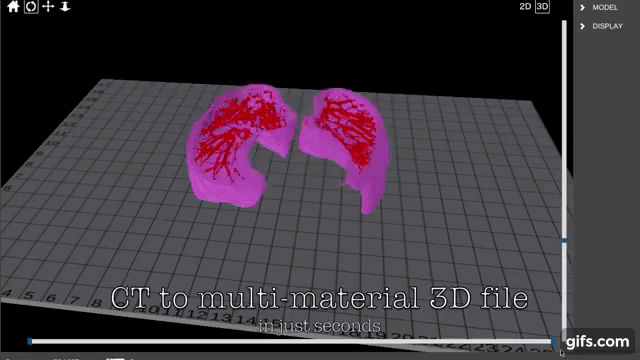Aether, the biotechnology company behind the multi-tool Aether 1 3D bioprinter, is developing an artificially intelligent (AI) program for 3D printing organ models.
Described as the “missing piece” in the wider, 3D bioprinting puzzle, Aether’s Automatic Segmentation and Reconstruction (ASAR) process will be capable of identifying different tissues in CT Scan data and converting the results into a mutlimaterial, 3D printable file.
3D organs at the “click of a button”
According to Aether CEO Ryan Franks, “AI is the only way bioprinting can reach its full potential.” With AI, the file preparation process is automated, bringing 3D printing closer to the “click of a button” usability which is essential to the technology’s growth.
The ASAR process will require no editing tools, calibration or human intervention to complete a file, and should reduce the process to minutes rather than hours.
Upon launch, ASAR technology will only be compatible with CT scan data, but Aether hopes to extend the technology’s capabilities across “all major modalities, such as MRI, X-ray, and angiogram.”
As materials and hardware develop too, it is hoped that this platform will be transferable for 3D bioprinting functional organs.
Image to Print
Aether is working with the Jang Laboratory at Harvard Medical School’s Brigham and Women’s Hospital on the development of its new “Image to Print” medical imaging platform. One of the Jang Lab’s current pursuits is to replicate the musculoskeletal system using 3D printing, and cell-cultures to make the models functional.

Lab lead Dr. Hae Lin Jang, who has also joined Aether’s forthcoming Scientific Advisory Board, says, “I am excited to participate in the development of an integrated organ printing system, and am looking forward to seeing how a multi-tool bioprinter with AI can enhance our research,”
“I believe this is a revolutionary platform, and hope my advisory role will help Aether empower the worldwide research community.”
Medical data translation
Translation of information between traditional medical imaging techniques and digital modeling is one of the chief preoccupations of software developers in the 3D field.
The Materialise Mimics Innovation Suite has also become the first software to receive FDA clearance for intended use in 3D printing anatomical models for diagnosis and, in partnership with Materialise, Siemens Healthineers is seeking to bring 3D printing capabilities to more radiology departments around the world.
For more Aether Insights, check out the Future of 3D Printing guest articles from Founder and CEO Ryan Franks and Aether Science Director Karen Dubbin.
For 3D medical news updates subscribe to the 3D Printing Industry newsletter, follow us on Twitter, and like us on Facebook.
Vote now for medical application of the year and more in the 2018 3D Printing Industry Awards.
Find your next opportunity at 3D printing jobs and post a vacancy with our free launch offer.
Featured image shows automatic generation of a mutlimaterial lung model using Aether Automatic Segmentation and Reconstruction. Clip via Aether 3D Bioprinter on YouTube


